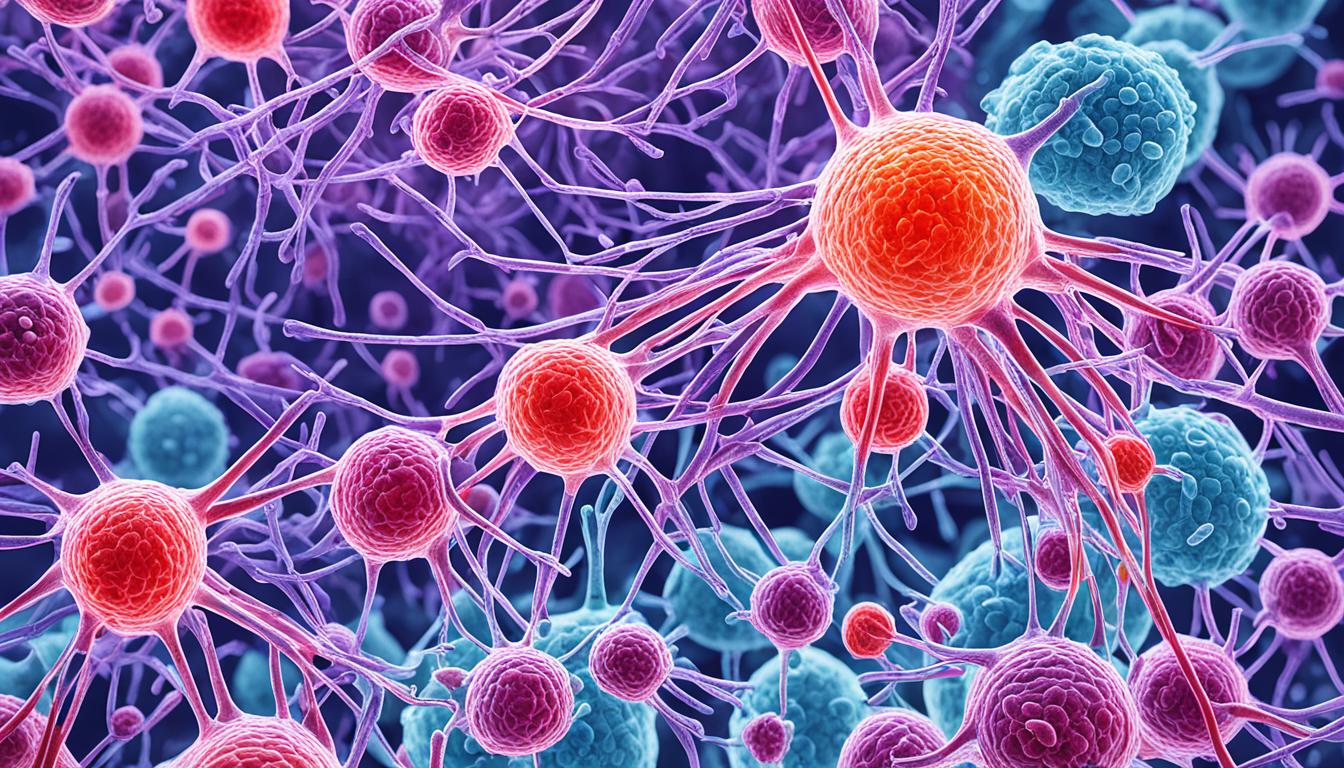Selective IgA deficiency is a type of primary immunodeficiency. It’s marked by very low levels of immunoglobulin A (IgA) in the blood. Yet, it doesn’t affect the levels of other immunoglobulins. This condition makes people more likely to catch various infections.
In cases of Selective IgA deficiency, autoimmune diseases can show up. Some examples are rheumatoid arthritis and celiac disease. Also, allergy-like disorders might occur more often. These can include allergic rhinitis, conjunctivitis, eczema, and asthma.
To diagnose Selective IgA deficiency, doctors will run blood tests. These tests look for low IgA levels alongside normal IgG and IgM levels. Managing the condition involves treating specific symptoms.
This can mean using antibiotics to fight infections. For recurring issues like chronic sinusitis or bronchitis, they might use prophylactic antibiotics. In some cases, people may need immunoglobulin replacement therapy.
A new area of research aims to look into stem cell therapy for Selective IgA deficiency. This type of therapy could open up fresh ways to handle the disease.
Key Takeaways:
- Selective IgA deficiency is a primary immunodeficiency marked by low IgA levels.
- Patients with Selective IgA deficiency face a higher risk of infections, autoimmune diseases, and allergic conditions.
- The disease is diagnosed with blood tests.
- Treatment targets symptoms and can involve antibiotics and immunoglobulin replacement.
- Stem cell therapy is a cutting-edge research area for Selective IgA deficiency.
Clinical Presentation of Selective IgA Deficiency
Having selective IgA deficiency means you’re more likely to get infections. If you lack IgA, the body’s usual defense against germs, infections can hit harder and last longer. This can lead to constant battles against ear, sinus, throat, and gut infections. Early diagnosis and management are key to avoiding complications and improving life quality.
One-third of those with IgA deficiency may also face autoimmune issues. This includes diseases like rheumatoid arthritis and celiac disease. The body’s immune imbalance might play a role in these related conditions. Hence, close monitoring and appropriate treatment are crucial.
People with IgA deficiency are also prone to allergies. Conditions such as allergic rhinitis and asthma are common. The link between IgA and allergies isn’t entirely clear. Managing allergic symptoms early can help reduce their impact.
The effects of IgA deficiency can range from mild to severe. For some, the condition might not show any symptoms. Yet, regular check-ups are crucial. This is to catch and treat any related issues, like infections, autoimmune diseases, or allergies, in time.
Evaluating Clinical Manifestations
Healthcare providers look at several things when checking for selective IgA deficiency:
- They ask about past infections and autoimmune or allergic problems.
- Look for signs related to these conditions during a physical exam.
- Run tests to check IgA and other immune system levels for a clear diagnosis.
By thoroughly examining these aspects, doctors can pinpoint selective IgA deficiency. This approach helps them tailor a treatment plan to each patient’s unique situation.
Diagnosis and Prevalence of Selective IgA Deficiency
Doctors often suspect Selective IgA deficiency if a person frequently gets ear infections, sinus issues, and breathing problems. They might also get constant diarrhea. A blood test confirms this if IgA levels are low or not there at all.
About 20% of those with Selective IgA deficiency might get it due to their genes. It can also run in families or show up with a condition called common variable immunodeficiency (CVID).
Sometimes, Selective IgA deficiency comes along with other immune system problems as a second issue.
| Prevalence Data | Genetic Susceptibility | Familial Inheritance | Association with CVID |
|---|---|---|---|
| Approximately 20% | Present | Reported | Reported |
More research is needed to find out how common Selective IgA deficiency really is.
Conclusion
Selective IgA deficiency is a primary immunodeficiency. It’s known for little or no IgA levels in the blood and secretions. This makes people more likely to get infections, autoimmune diseases, and allergies.
To diagnose this deficiency, doctors do blood tests. They look for very low or no IgA, but normal IgG and IgM. The treatment focuses on controlling symptoms and avoiding serious problems.
Doctors use antibiotics to treat infections. For those with serious, repeat infections, immunoglobulin replacement therapy is an option. Research is ongoing. Scientists want to better understand this condition and find new ways to treat it, like with stem cell therapy.
The outlook for most people with selective IgA deficiency is positive. But some might face more challenges. There’s a push for more research and better management. This is to make life better for those living with this deficiency.

